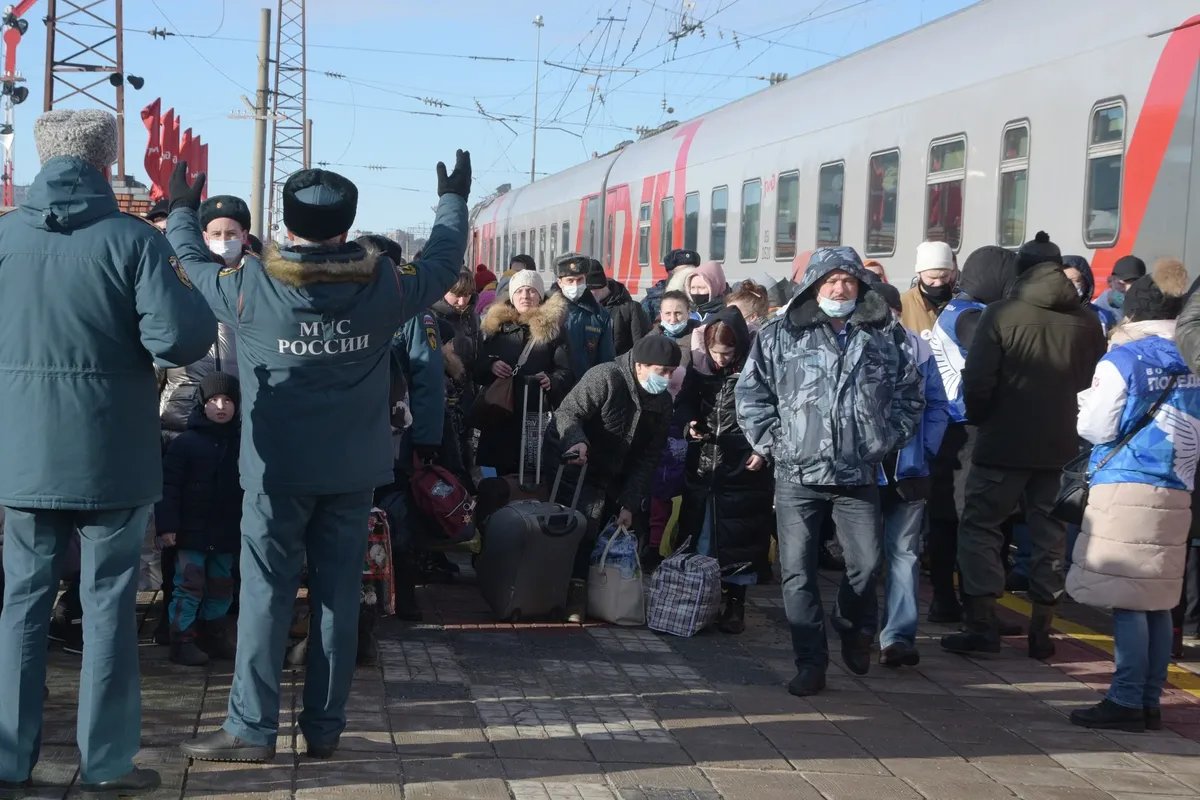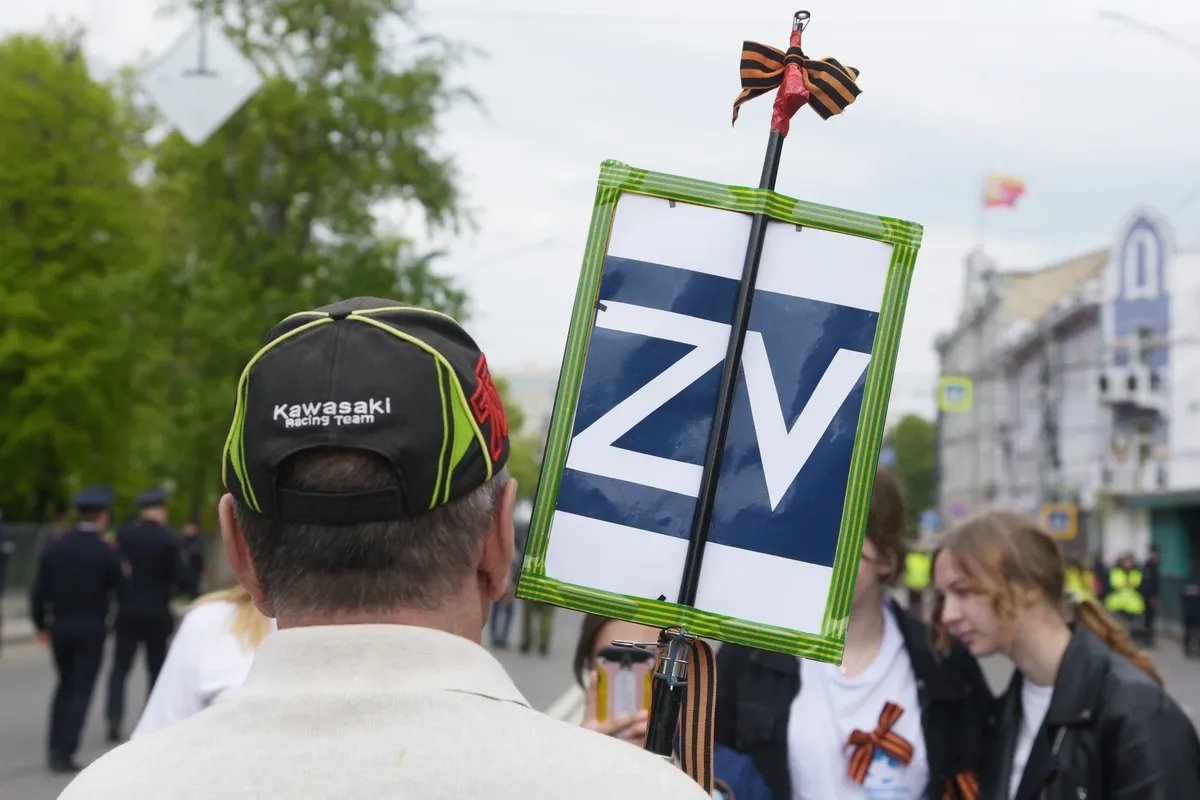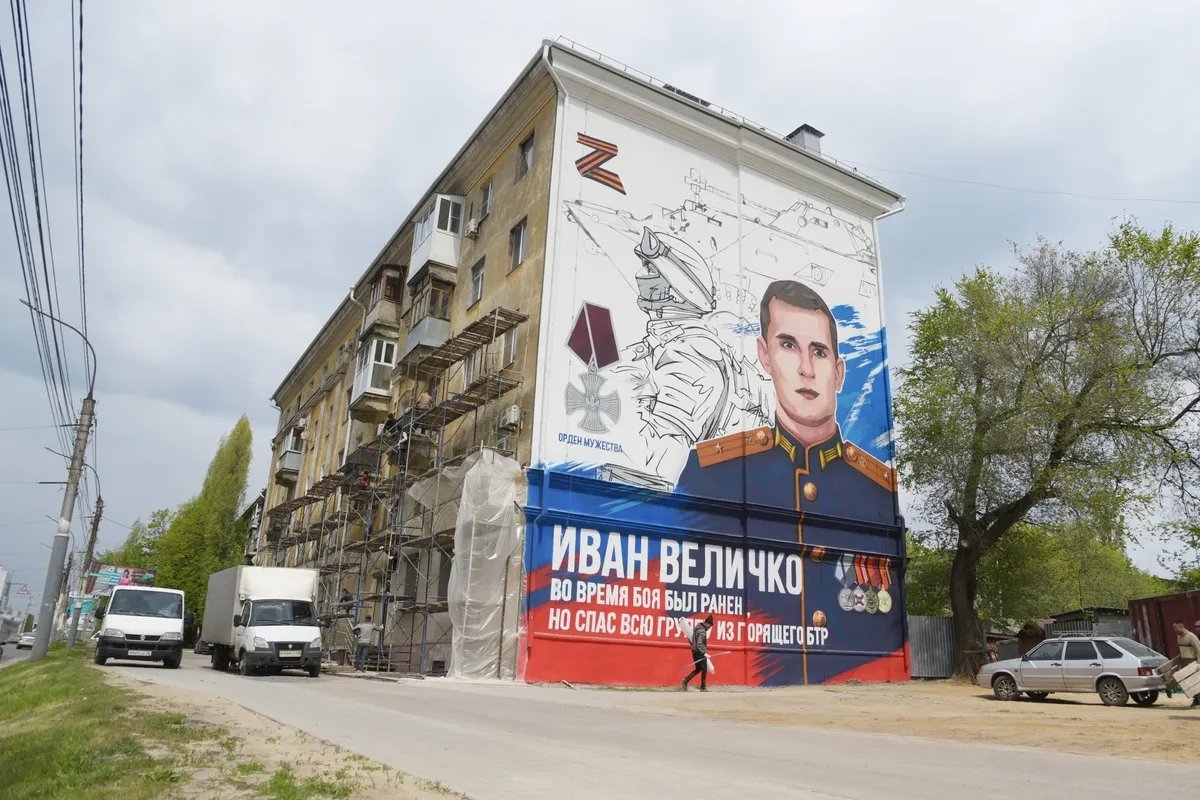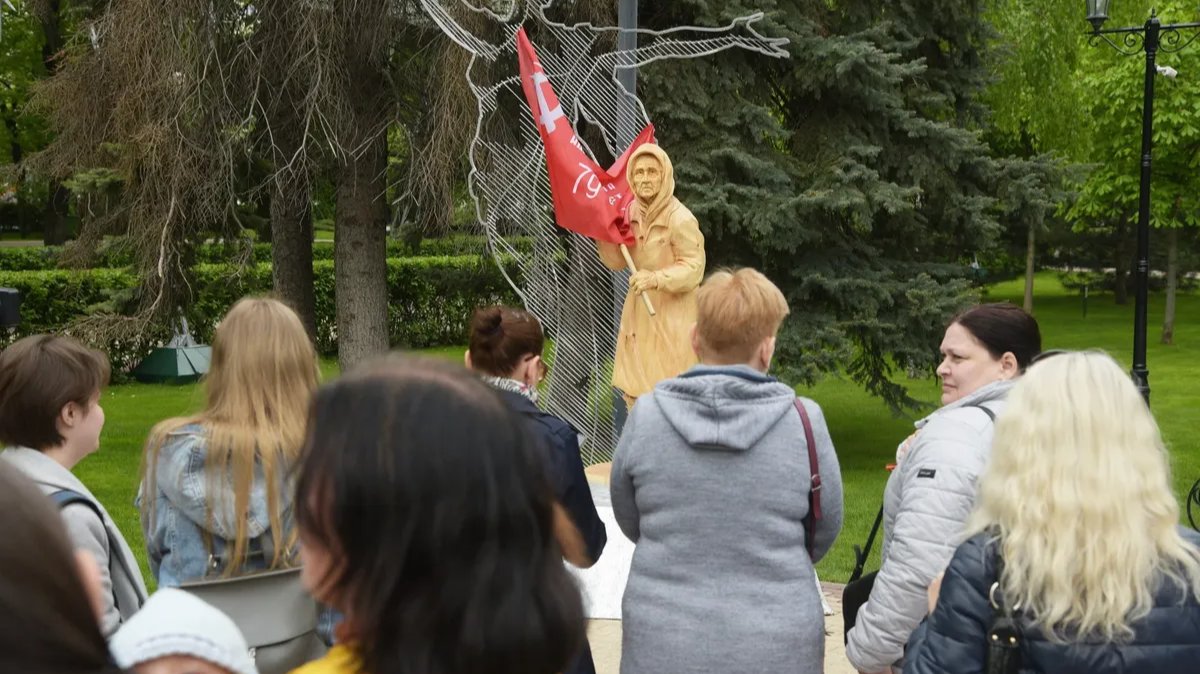I was working on my laptop at home on the 9 May, when exactly at 10 p.m. I heard a bang. The first thing I thought was: “Our air defense messed up”. The second thought, a more reassuring one, appeared later: “This must be typical fireworks in honour of 9 May, purchased by the only company that had applied and participated in the bidding in mid-April.
That turned out to be true: for ten minutes, the dark sky lit up as fireworks thundered over the dam of the Chernavsky bridge in the very city centre.
Local residents have gotten used to loud sounds over the past 10 weeks — the roar of fighter engines can be heard over and over, night and day, from any place in Voronezh, a city with over a million residents.
Numerous stray dogs at the Voronezh reservoir do not care much about the noise, unlike house dogs: for instance, some of them try to run away when they hear these sounds on a walk, while their owners try to catch them.
The Voronezh region is a border region; the distance from the city to the only (there used to be two of them) border checkpoint, which is close to Bugaevka village in Kantemirovsky district, is around 290 km. It borders the Markovsky district in the Luhansk region of Ukraine. The total length of the border within the region is 97 km, where 2.7 km belong to the Rossoshansky district (bordering the Novopskovsky district of the Luhansk region), and the other part belongs to the Kantemirovsky district.
The southern parts of the region are full of people in camouflage uniform and tented military Ural trucks with letters Z — the infamous symbol of the Russian invasion.
The same can be said about Rossosh, which is 90 km far from the border.
Around 90 percent of people in these southern parts of the region have relatives in Ukraine, many studied in colleges and universities of Luhansk, not Voronezh, and settled down in Ukraine.
Any reference book will inform you that in the 1920s and the early 1930s, the southern regions were inhabited by over 30 percent of ethnic Ukrainians. The official paperwork of the southern regions was even translated into the Ukrainian language. The "Ukrainisation" of the Voronezh region ended (forcibly) only in 1932.
This is why so many residents of the region look at what is happening in the neighbouring country with a sore heart: it’s their parents, brothers and sisters are being bombed.
Sergey, whose relatives live in Ukraine, though not too close to the hostilities, says: We stopped calling each other because we were fighting like cat and dog. They say: “You attacked us”, what can I answer?
I met with an official of one of the districts in the region. It was the beginning of March and he told me about his mother-in-law in Mariupol, whom he had lost touch with.
She was brought up in the USSR. She started to speak about our government not without hostility (to put it mildly) a year ago, though she used to praise our president. We disagreed a lot and even argued because of that, and now she is out of reach while Mariupol is being bombed…
I made some stupid joke. He got silent and I regretted that. He wondered blankly: “What is it all for? Is my mother-in-law, who survived the War in her youth, a fascist or something?”
Elements of crime
The life in Voronezh has not changed with the beginning of the "special operation", but it now consists of small things that have plenty to do with Ukraine, no matter if people want it or not.
A few days before the "special operation", refugees from Donbas began to arrive in the region. The federal media reported that there would be more of them in the Voronezh region than in any other Russian region — over 7,000 people (out of about 92,000-95,000 refugees sent to Russia in total).

Refugees at the railway station in Voronezh. Photo: Ivan Ivanov
The first refugee trains arrived in Voronezh on 21-22 February 2022. There were 910 people on the first train (358 of them are children), and 976 on the second one (women, elderly men and children, including 113 children from orphanages and boarding schools).
The people stayed in Voronezh, in the Goluboy Ekran (Blue Screen) camp; some of them went to Bobrov and Liski, which is located 100 km further away. New groups of people from Donbas were accommodated in all districts of the region.
“We come from Donetsk. Donetsk National University”, says Valentina Nikolaevna. “Several buses were brought to our university yesterday and we were offered an evacuation.
We were seen off by the head of the Republic and the mayor of the city. They told us not to worry and promised that it wouldn’t take us long. We didn’t argue and took only the essentials — documents and personal belongings, and off we went”.
She sighs deeply. “The outskirts are fired at. Shells were already firing in the Yasinovatsky district. Yesterday I called my son-in-law, he said that the water supply was cut off. We live near Mariupol, and they shoot from there. Shooting is also taking place in the villages, take Gorlovka for instance. To be honest, we have been sleeping on this volcano for eight years. The borders are being constantly fired at. People are always in the basements. When they show you terrible pictures — a shell flies into a house, and people’s arms and legs are torn off — they are true…
By order of the governor of the region Alexander Gusev, the refugees were fed, given water, clothes and money, and even entertained — they brought artists that held shows for children. There were even football classes.
For example, on 24 March, Fakel Voronezh FC, playing in the Football National League of Russia, held a master class at its training camp for 13 children from Donbas. It was held at the Chayka stadium. When the spokesman for the club was telling the children about the team, an aircraft engine roared, and the guests, who arrived at the stadium from the Gorky sanatorium in Voronezh, literally flattened themselves against the ground.
Parents filmed this communication of their children and footballers on their expensive smartphones. Somebody from the crowd complained: “We're tired of their hospitality, they won't let us rest — it’s always either an excursion, or an exhibition, or a master class. I'd rather go home."
For some reason, no refugee wanted to talk to reporters. The ones who did, spoke without much enthusiasm.
Even more embarrassment to come: local authorities in one of the districts, on their own initiative, rushed to offer residents of Donbas settled in a boarding school temporary jobs.
But when they learned that they are offered to work at a local agricultural enterprise with the payment of 25,000 rubles (about $500, which is pretty decent for a Russian village), the guests scoffed at the authorities: “You’d better work yourselves for this money!” The scandal was nipped in the bud, information about this did not go far, and around the beginning of April, people began to slowly return home. Although the authorities do not provide the exact figures today.
Someone else’s special operation
Of course, someone in the Voronezh region had a spring outbreak of patriotism. There are a few cars with letters symbolising the special operation on the windows in Voronezh, no more than one percent. In parts of the region where the Internet works worse, and federal channels work better, there are no more than 3-5 percent of them.
There were noticeably fewer St. George Ribbons the day before 9 May, and the procession of the Memorial March in Voronezh was accompanied by the toughest security measures to date.
Its route was kept in secret even from journalists with the state media and became known only the night before. It became shorter, while the number of turnstiles and metal-detection gateways was increased several times compared to the years before the Covid-19 pandemic.

Victory Day in Voronezh. Photo: Ivan Ivanov
It seems that there were no reasons for such precautions. Voronezh is not yet Belgorod or Bryansk, where oil depots burned "due to careless handling of fire", and not Kursk, where a bridge was blown up.
Locals find it rather insulting ("Why can't we be as good as them?"), though they got their time to shine when the region's air defence shot down a presumably Ukrainian drone over the Shilovo village.
The locals were not given an explanation as to what this drone was supposed to do 150 miles away from the border, where there are no strategically important objects, except for the Novovoronezh nuclear power plant, which is at least 40 miles away (the station can withstand a direct hit of the aircraft). However, governor of the city Alexander Gusev reported the incident on Telegram. “I keep the situation under personal control. Nothing threatens the life and health of the inhabitants of the region,” he wrote.
Apart from that, the life in Voronezh goes on. Concerts and rallies are held in support of the troops; money is collected. And not only “for residents of Donbas”, as it was for the last eight years, but also for military personnel.
It is not clear who and how will transfer all this to the troops, but the obvious idea that if people collect money and food for the army, it means that something is wrong with the “indestructible and legendary” army, doesn’t really bother anyone. The authorities are proud of this tax harvest.
Farmers and entrepreneurs were obliged to add to the "common fund" whatever they could. They donated money and food.
But apparently, the city budget is not doing so bad: before 9 May, a giant (17 by 14 metres) graffiti dedicated to local resident Ivan Velichko, who, according to the state media, "performed a heroic deed during the special operation in Ukraine" appeared.
Mayor Vadim Kstenin and adviser to the head of the "Donetsk people's republic" ("DPR") Igor Kimakovsky arrived to see the final stages of how the graffiti was made. To create the painting, artists used aerosol and paint made in Voronezh. But even here, there is a catch: according to the authors, "the durability of the work depends on the quality of materials, weather conditions and the intensity of sunlight."
Governor Alexander Gusev demanded that "the military glory of the special operation in Ukraine should be captured for years to come in a modern format."
As for the “military glory”, the city made its mark after the famous Voronezh woodcarver Alexander Ivchenko created the figure of a Ukrainian elderly woman, who went out with the Soviet flag to greet Ukrainian soldiers, who eventually stepped on this very flag.
The authorities of the city and the region supported the idea, the stages of Ivchenko's working process were closely monitored by the state media, and as a result, the woman with the flag was shown on 9 May on the city's main square, after which the sculpture was placed in the Diorama Museum. A real flag was inserted into the hands of the wooden woman. It is a copy of the Victory Banner, raised over the Reichstag in 1945, which was brought by the adviser to the head of the "DPR", Igor Kimakovsky.

The graffiti dedicated to local resident Ivan Velichko. Photo: Ivan Ivanov
The price of silence
Nowadays, people are noticeably cautious during their conversations, avoiding the topic of what is happening with their neighbors as much as possible — after all, what is happening now in Ukraine is not seen as the same to a Voronezh and a Khabarovsk citizen. For many residents of the region, the neighboring state starts "somewhere in the south of the Voronezh region."
Even at family gatherings, there are usually only a couple of people seriously muttering something about Bendera and fascists. The remaining four of five people stay silent on the topic. It has been proven during many dinner parties that those who stay silent are definitely against the "special operation".
And now, a completely innocent toast “To peace!” is perceived at the table as "To the end of the war!"
Matvey Grogoryev, exclusively for “Novaya Gazeta. Europe”

